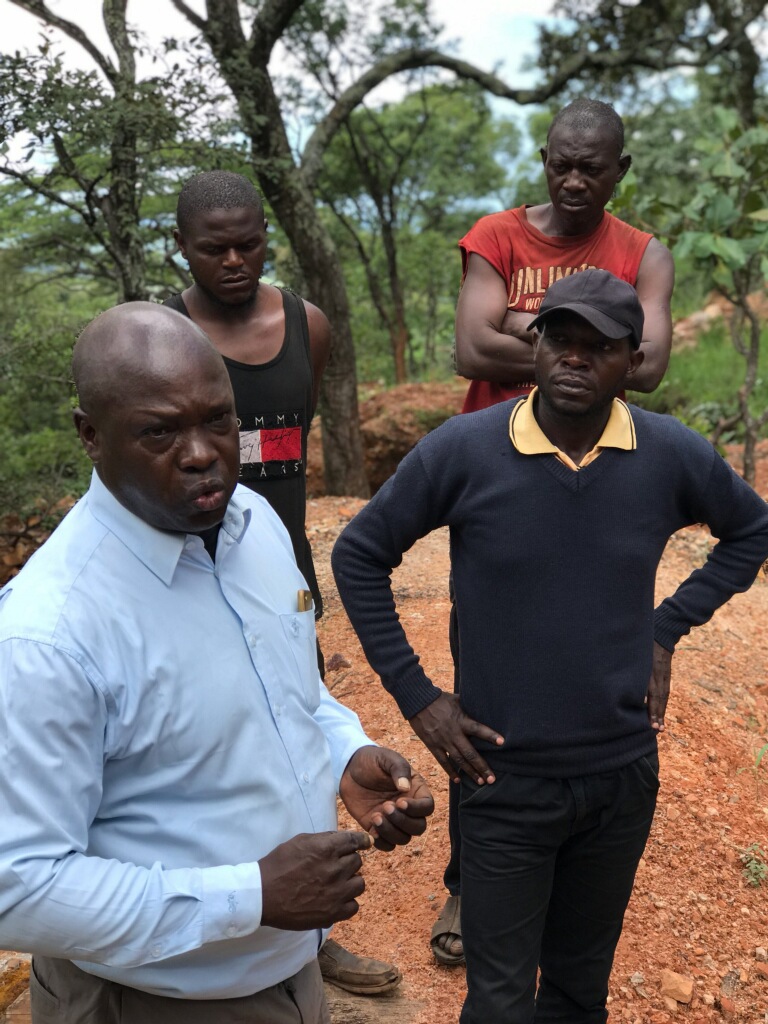Advocacy to change the mining code in the DRC leads to community development
By Valery Nodem | Presbyterian Hunger Program

Artisanal miner in Lubumbashi transporting bags of cobalt from the mining pits to be processed before transportation. They do very hard work and are exposed to a lot of risks, usually for very little pay. Photo by Valery Nodem.
Despite being one of the world’s richest countries in natural resources, Democratic Republic of Congo (DRC) is among the world’s poorest countries. This contradiction, fueled by endemic corruption and a dysfunctional public administration, can feel insurmountable. But Jean Marie Kabanga, the coordinator of our partner network POM (Joining Hands DRC), knows that each small step brings the country closer to systemic change.
For years, and with the support of Presbyterian Hunger Program (PHP) through the Joining Hands initiative, POM has been advocating for better mining policies in Congo that respect people, the environment, and ensure communities within mining zones benefit from mining revenues. In 2018, POM won a huge campaign victory, as the DRC adopted mining legislation that requires 10% of all mining royalties be set aside for investment in future generations. It also requires mining companies to provide 0.3% of their profits for development projects for communities affected by their mining operations.

The newly built administrative office building for Bukanda constructed with mining revenues on the left and on the right is the old administrative building built in 1970. Photo courtesy of POM.
“Things are changing,” exclaimed Mr. Kabanga. After almost a decade of community organizing and advocacy, communities were finally seeing some tangible results on the ground: mining companies had started paying revenues at the local level, and POM had worked with local communities to plan how the funds would be used.
In Durba, a brand-new multiservice community hospital is being built. In Bukanda, communities decided to construct a new building to house offices for their local administration. In the same community, roads were repaired, new markets and another health clinic were built, and 4 ambulances were purchased. Many other projects are being developed in various communities. “It feels good to see the change that we’ve been fighting for all these years,” Jean Marie shared.

Jean Marie Kabanga, the coordinator of POM, speaks with artisinal copper miners. Photo by Valery Nodem.
For local communities in a country like Congo, these “small changes” are huge. POM invested years of organizing that allowed local communities to come together and shape how they wanted to see their own development. It took years of work for POM to organize, push, and educate populations on why such a change mattered and how it was possible. Solidarity between communities in Congo, friends, and allies in the U.S. and around the world led to the sharing of approaches, ideas and strategies, and dreaming together of new possibilities.
POM credits the support of PHP/Joining Hands as a critical factor in this success. But this is not the only way our partnership has supported success. For years, POM was calling on the mining company Frontier to take responsibility for the poor resettlement of communities it had displaced to make way for its mining operations. Families were resettled into poorly built homes that quickly began to fall apart.
One way that PHP assisted the work of POM was to fund the making of a documentary highlighting the plight of the resettled communities. The video was used as an advocacy tool to demand that communities receive their fair share of mining wealth. Recently, the documentary caught the attention of a foundation in the US. POM is now in the process of signing a contract with the foundation for the construction of 52 houses for the resettled households in the village of Kinfumpa.
“The families in Kinfumpa will be so pleased,” Jean Marie told me excitedly. “The new homes will significantly improve their living conditions,” he added.

The new multi-service healthcare center built with mining royalities in the Durba mining community in the Haut-Uele Province, North East. The old health center can be seen in the distance on the left. Photo courtesy of POM.
This is the work that Joining Hands does around the world. Joining Hands believes that global solidarity is a key component for systemic change, and recognizes that systemic change takes time, energy, commitment, and perseverance. And the results are usually worth the investment.
Joining Hands brings together people in Cameroon, Congo, Haiti, India, El Salvador, Peru, Sri Lanka, and the United States who see the need for change in their countries and communities, and supports their campaigns for systemic change locally, nationally, and internationally.
To find out more about Joining Hands and its accomplishments of the last 20 years, watch this video.
The work of the Presbyterian Hunger Program is possible thanks to your gifts to One Great Hour of Sharing.